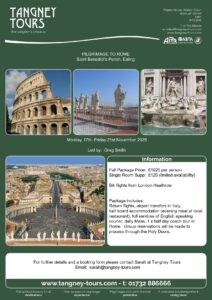Dear Parishioner,
As if life is not complicated enough at the moment we have the prospect of another two months of insult, rancour, barbed exchanges and downright nastiness before a US Presidential election in November. So how would you define Trump’s ‘ticket’ or Biden’s for that matter? Abraham Lincoln, the 16th POTUS, was elected to office on an anti-slavery ticket, an election that brought forward the American Civil War. In 1863 Lincoln issued a proclamation freeing Southern slaves, and two years later he masterminded the Thirteenth Amendment, prohibiting slavery anywhere in the United States. He was opposed to all forms of slavery, not least people becoming slaves to their own anger and resentment. Which brings me to today’s gospel.
So how often should I forgive? asks Peter. Seven times, perhaps? We don’t know the circumstances of the question nor what triggers it but it is possible that Peter wants to know when the spirit of retaliation can kick in. Perhaps we can sense his need for ‘pay back’ for some wrong done to him but first he must try and clarify when exactly it is that he can be let off the leash. Jesus’ answer is no doubt not what Peter was expecting; of course he doesn’t mean forgive seventy-seven times, and not seventy-six because that’s not enough nor seventy-eight because that’s really too much; he is simply telling Peter that the question itself is the wrong question to ask. Jesus is not into playing a numbers game here. He is asking instead for a full and unconditional commitment to forgiveness. How on earth is that even possible when for many of us we simply start to get even if not after one offence, then probably after two at the most? I am reminded of those selfless individuals who have tragically experienced the violent death of a loved one as a result of an act of blind hatred, or as a result of some mindless moment of gratuitous violence yet who still are able to offer forgiveness – these surely are living examples of such unconditional love. But what a thing to ask of anyone.
There is of course a twist to our story in the Gospel, as we have so often come to expect. The servant is about to lose everything and is given more time to repay his debt. The reality is that he will never be able to repay the debt, it is so huge. There is therefore no way justice can save him and as one writer points out ‘he may be on his knees before the king but his back is against the wall’, there is really no way out. But the story is clear: there is a way out, there is a way for redemption to come out on top and that is what the mercy of God gives us. And just as there are consequences in living in debt to the huge mistakes we make, there are also consequences in living in debt to a forgiving God and His divine mercy. Those consequences are lived out in the second part of the story when the same debtor who has just been forgiven now assumes the role of the vengeful judge. He shows no mercy this time, his experience has taught him nothing. The servant has been forgiven by the king (symbolising God) but has learned little or nothing as a result. He cannot love his neighbour as himself and without forgiveness, violence emerges: not only does he throttle the man but consigns him to the very fate that he himself has just been released from.
So today’s gospel is powerful and provocative and perhaps not entirely a reflection of our common Christian experience but it surely is the case that every time we ‘put our hands round the throat of a debtor’ we are once again sold into the slavery of revenge, retaliation and reprisal.
The wisdom of the writer whom we know as ‘Jesus ben Sira’ in today’s first reading from Ecclesiasticus uncannily prefigures the words of the man from Nazareth: ‘Forgive your neighbour the hurt he does you, and when you pray your own sins will be forgiven.’ The purpose of calling our sins to mind is not to paralyse us, but to remind us that we all live in the gracious forgiveness of God. Whoever we are we remember our sins because we need to remember always to forgive. And who knows, perhaps there is yet time for decency and right judgement to hold sway over the politics of revenge and bitterness?




